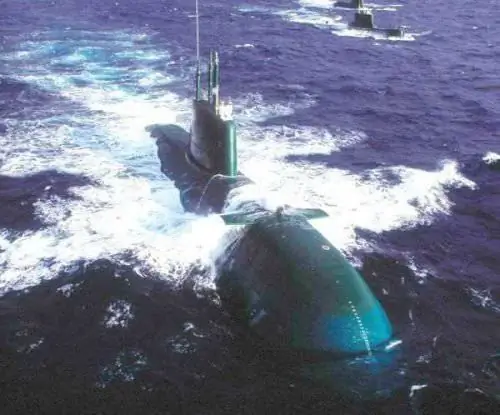- Author Matthew Elmers elmers@military-review.com.
- Public 2023-12-16 21:49.
- Last modified 2025-01-24 09:17.

Submarines are designated by the Israeli command as the "main offensive force of the Navy," but they must also collect intelligence information both in times of peace and in times of war and conflict. They are a strategic threat to the enemy.
According to foreign sources, submarines are Israel's long arm along with strategic aviation. According to the same data, missiles on submarines can be equipped with nuclear charges, which makes them the main striking force and, in the event of an enemy strike, a weapon of retaliation at the same time. It is not for nothing that for decades not a single description of the operations of the Israeli submarine fleet has got into the press. It is only known that two years ago, Chief of the General Staff Ashkenazi awarded the squadron with an honorary badge - "for the largest volume of operations in the army" …
When it was recently reported that one of the submarines passed through the Suez Canal towards Iran and entered the Red Sea, the Navy took the leak as a definite setback. But secrecy has its drawbacks: for example, volunteers are deprived of some of the information. Research carried out over the past five years has proven that those who take diving courses do not even know where they are being taken at first.
“The submariners' course lasts a year and four months, but in reality it lasts three years,” says Major Omri (23). - The army cannot teach people for a long time, you need to get a return. Therefore, submariners study for two years after demobilization. After the course, you can serve in one of the four combat units of the submarine, but the study continues constantly. If you don't want to study, you won't be a submariner.
The divers' course is so classified that one cannot even discuss its program with each other. All study materials are handed over and locked up. No cell phones, no one to be contacted. The discipline is iron.
“Sometimes it seems overkill,” says Guy, whose training is coming to an end. - But it is necessary. All punishments are collective, thus creating a team spirit. Everyone is in sight of each other 24 hours a day, everyone wants to know about you. If someone is faced with difficulties, the whole group should help him.
Guy is one of the few Tel Aviv representatives on the course. True, 70% of the cadets are residents of cities, but small cities, from the periphery. For four and a half months, the cadets study how the submarine behaves: physics, mechanics, electricity, electronics - all at the level of five units of the certificate of maturity. Even then they are torn away from the house. Those who can't stand it are expelled. The second stage - another four and a half months - is learning how to serve in each of the combat units. At the same time, training trips begin, lasting up to nine weeks. And then the cadets receive "wings" and the rank of foremen. Only a few dozen people remain - so few that the squadron commander can get to know everyone. From that moment on, they will be on enemy territory for more time than anyone else. They will have to participate in offensive operations, while no one can help them in case of danger.
Major Yair, now the submarine's deputy commander, recalls that once it happened to him:
- I didn't know anything. There weren't even childhood fantasies. What keeps people on the boat is that no one operation is like another. And responsibility. Every malfunction, every unsuccessful detection of a submarine, can have consequences of national importance.
- Maybe you constantly think about Dakar? (submarine sunk in 1968)
- No. Fear of the unknown keeps you in constant tension. When we cross the border, the commander gives the command to change the level of readiness. But no one panics, routine work continues, only it becomes much quieter. The more difficult the problem, the more balanced you need to remain. You can sit in a combat post for many hours in extreme tension. And then the danger passes.
Submitted from the site ruswww.com - media reviews and translations of foreign literature. Translated by Theodor Volkov, material from the newspaper "Yediot Ahronot".






